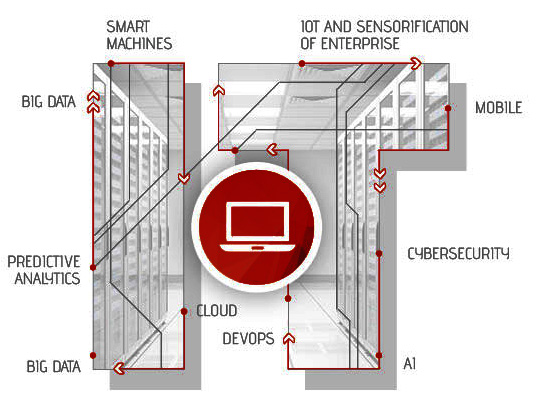Digital Transformation is not just the acquisition of innovative technologies within production processes.
The term "Digital Transformation" implies a profound change on every element of the business reality: from strategic
decisions on market positioning and on the products / services to be developed, up to the structure of the
entire production chain and distribution to the final consumer.
It is a process that requires the willingness, at an entrepreneurial level, to develop a new business model within which to operate the business.


The DIHV acts as a reference point and guide to develop the best strategies, designed and optimized for the individual
company , in order to support SMEs in seizing the opportunities offered by digital transformation.
Because every company, especially in the context of SMEs, has its peculiarities that must be respected and its specific
strengths that must be enhanced.
The final and overall objective is to make innovation "alive" in the company, in order to be able to rapidly acknowledge the continuous flow of technological and digital "novelties" that become available on the market.
The processing of large amounts of data, coming from sensors or statistics (weather, accounting data, etc.) is conducted with real time analysis techniques (historical series analysis, multivariate statistics, predictive models) in order to have a complete view of the reality in question.
A large research area that contains, in addition to Expert Systems and Neural Networks, Augmented Intelligence and Machine Learning, aimed at designing advanced products or at inoculating "intelligence" in machinery and digital analysis and evaluation systems.
Virtual Reality and Augmented Reality find space both as autonomous products / services, in marketing, retail and in the tourism sector, but above all they are useful working tools to reorganize the production chain, and to manage advanced training courses for staff.
The development of the Internet and 5G mobile technology allows communication between different objects, both at home and in open areas. Applications range from decision aids in agriculture to products / services for use in the automation of factories and in the private life of the consumer.
The issue of security, which until now had been limited to the secure processing of personal data, and to contrast the wide growth of various forms of cybercrime, now becomes even more important because all of reality is networked: infrastructures, objects of daily use such cars that are potential pickings for hackers.
With blockchain technology is realized the Internet of Transactions namely the recording of encrypted information on distributed and unalterable archives; it overcomes the logic of centralized archives (in the PA, in banks) at much lower costs and with greater security and reliability.